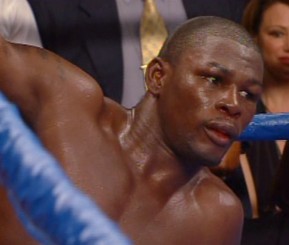 27.04.09 – By Brian McDonald – When Jermain Taylor climbed through the ropes to fight Carl Froch on April 25th it was for more than just the WBC belt. That night it was his reputation, future, and legacy that would be decided within the square circle. This was Jermain’s chance to eradicate all of the skepticism about his lack of stamina, weak chin, and controversial wins.
27.04.09 – By Brian McDonald – When Jermain Taylor climbed through the ropes to fight Carl Froch on April 25th it was for more than just the WBC belt. That night it was his reputation, future, and legacy that would be decided within the square circle. This was Jermain’s chance to eradicate all of the skepticism about his lack of stamina, weak chin, and controversial wins.
By the end of the bout, in the 12th round, Jermain Taylor was exactly 14 seconds away from being “back.” Instead, as you’ve undoubtedly read by now, Jermain Taylor left the ring with a shadow of doubt that will reach back to his greatest accomplishments as a professional fighter.
If it wasn’t before, it’s clear now, that Taylor has ring stamina that’s only befitting of fighter with knockout power. Unfortunately, Jermain just doesn’t possess the one-punch knock out power and never has – at any weight. As he moved up in the ranks and faced the best of the best, he was never able to wear down fighters and finish them. It was always Jermain that wore down. He had Pavlik on the canvas and couldn’t finish him. He couldn’t put away Corey Spinks or Kassim Ouma – two light fisted fighters that had been knocked out earlier in their careers. It was 4 years and 5 pounds lighter was the last time Taylor was able to score a knockout, against the Haitian Sensation, Daniel Edouard. The fights leading up to, and including that bout, Jermain’s career was full of promise. Against an aging and slow starting fighter like Bernard Hopkins we saw Jermain rack up rounds early in the fight only to see him clutch his way to the final bell. We didn’t know it then, but that would be the legacy of Jermain Taylor.
When your greatest accomplishments carry an implicit asterisk amongst the fans of the sweet science, every fight either confirms or denies those suspicions. This is not to say that Jermain Taylor wasn’t the legitimate undisputed Middleweight champion; rather, it is a reminder that his wins against Hopkins and Wright were widely contested. The fight against Froch will now become part of the discourse when reassessing the accuracy of those ringside judges. Losing this fight in the same way he lost to Pavlik will lure enthusiasts and historians to look on all of his past accomplishments with a raised brow. The controversial wins over Bernard Hopkins and Winky Wright undoubtedly lost some of their perceived authenticity. Today, it’s simply harder to argue that they were legitimate wins. The win over Jeff Lacy, for example, will now be viewed differently as well as Lacy’s status as a game opponent is quite simply devalued. The beauty of the bout against Froch and Pavlik is that they were decided in the ring by the fighters.
This loss plays into the assessment of his career from a historical vantage. In terms of history, Taylor’s career as an elite fighter was swiftly rendered past tense at the hands of Carl Froch. A big part of the appeal that draws interest in big fights is the unknown. Will an undefeated fighter, like Calzaghe, finally lose? Will the undisputed champ, like Mike Tyson, finally meet his match? Can Hatton stop Pacquiao? It’s that element of uncertainty that breeds excitement and speculation and ultimately draws fans to the ringside or pay-per-view purchases: predictability doesn’t. Should Jermain Taylor continue to climb into the ring as a contender facing elite opponents, we’re fairly certain what we’re going to see.
With his appealing personality and Olympiad credentials Jermain Taylor was a guy you wanted to see win. Had Jermain held on for another 14 seconds, we all would be anticipating his next big match and discussing his legacy. He came that close.